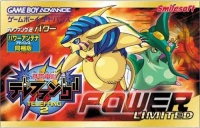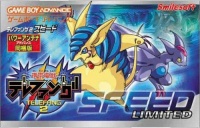Telefang 2
| Keitai Denjuu Telefang 2 | |
 
| |
| Developer(s) | Smilesoft |
|---|---|
| Publisher(s) | Natsume |
| Designer(s) | Unknown |
| Release date | Unknown |
| Genre | Console role-playing game |
| Platform | Game Boy Advance |
Keitai Denjuu Telefang 2 is the sequel to the first Telefang game for the Game Boy Advance. Taking place in a different part of the Denjuu world from the first one, this game shares some qualities with Telefang 1. The battle system is similar, as is the gathering-phone-numbers system, but a good deal of things are quite different from the original.
Plot
The game follows a blue-haired protagonist (named by the player but original called kyou) as he journeys on his quest to become a T-Fanger. Along the way, he encounters Diablos, who is not content with humans entering the Denjuu universe and so is killing off the Antenna trees, thereby cutting off access to the human world.
With only one antenna tree in existence, that tree was the only entrance left from the human's world to the Denjuu's world. The player, naturally, must stop him before he is stuck in the world forever. [1]
Differences in the two releases
- Main article: Differences between Telefang 1 and Telefang 2
There have been significant differences in the two games, Telefang 1 and 2.
- The sprites were redrawn
- The background music was changed
- New Denjuu were introduced
- Move types were introduced, and a Denjuu which has a type disadvantage would not necessarily lose if it has good moves.
- In Telefang 1, the starter partner would be different in both versions (Krypto and Fungus), while in Telefang 2 it would be Rex for both versions.
- The new Denjuu reform evolve differently. Unlike the old Denjuu, their habitat type would change as they reform evolve.
Release
This game was only ever released in Japanese; however, there are hackers who have been able to edit the hexadecimal values in the ROM images to release an English patch.